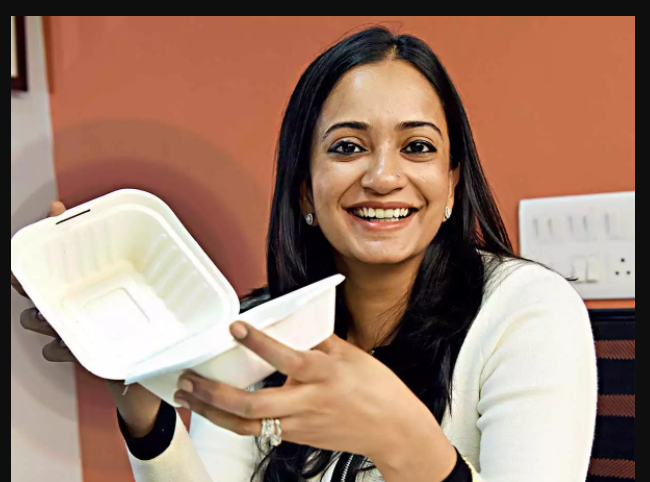
When Prime Minister Narendra Modi urged people to rid their homes and workplaces of single-use plastic by October 2, Rhea Mazumdar Singhal had reasons to smile. The 37-year-old is the founder of Ecoware, a biodegradable food packaging company based out of Greater Noida.
It makes plates, cups and bowls from agricultural waste such as sugarcane bagasse. The company produces over 1,500 tons of biodegradable material annually. It translates into 50 million products a year, which they sell to clients like IRCTC as well as restaurant chains like Haldiram and Subway. Companies like Bain and JP Morgan, meanwhile, use Ecoware products in their offices. Singhal spoke to Varuni Khosla about the green road ahead. Edited excerpts:
You started the company a decade ago. What are the challenges in this space in India?
When we were growing, there was no plastic ban, no Swachh Bharat Mission. We were going from company to company, asking them to try our products. When we started, our price differential with plastic was over 50%.
That is now down to 15%. We are still 40% more expensive than Styrofoam products, though.
I remember I was driving through Mathura once and ordered a parantha, which was served on a Styrofoam plate, and it literally melted into the parantha. Still it was very difficult to convince people to use our products.
Then we kind of changed the narrative — we went to schools and colleges and started talking more about how plastic products are bad for one’s health.
Is the demand for your products growing?
This year we are looking at Rs 15-20 crore in revenue. It is a good place to be in but we are severely constrained by capacity. Even if we have three or more factories, we won’t be able to meet the massive demand in India, which comes even from places such as Mysuru, Ranchi, Hubballi and Bareilly.
How big is the market for biodegradable packaging in India right now?
It’s difficult to determine the size of the market.
Any place that produces food is a potential client for us — be it someone’s home or a local thela that sells food. The problem is awareness. But the business we are in is such that demand exceeds supply by at least 3-4 times.
What was your initial investment?
We had our first facility in Dehradun with a capacity of about 200 tons. We have moved up to 1,500 tons now. We have gone from making 9,00,000 pieces in 2010 to over 50 million pieces in 2019. Our Noida facility cost about Rs 16-17 crore, including land, building and machinery.
In 2009, we put in about Rs 2 crore. We broke even around 2016-17.
The inspiration for the project came from my father-in-law, Sunil Singhal, a chemical engineer who works in the sugar industry.
He runs a sugar refinery and there was a lot of bagasse, the fibrous residue of sugarcane, which was used in the boiler and as cattle feed. We then did research and found that we could make products out of it it — that it was commercially viable.
What was your big break?
It came during the Commonwealth Games in 2010. They had specific requirements such as biodegradable material that was certified and we supplied such products to them.
What are you working on right now?
We are working on reducing plastic waste in ecommerce packaging by using different types of biomass. These can be put into a compost pit and will decompose within 90 days. Our latest line is made from paddy straw, which is burnt to clear farm land and causes severe air pollution in cities like Delhi.
India generates close to 26,000 tons of plastic every day according to the Central Pollution Control Board. What is a matter of concern is that over 10,000 tons of this waste remains uncollected.
Where’s your current business coming from?
Most of our business — about 60% — comes from QSR (quick service restaurants). We are exporting to nine countries now and that comes to about 20% of our sales. The rest goes to retail and ecommerce companies.
What about food aggregators?
They should do something about their environmentally unfriendly packaging. If the Indian Railways, which serves the largest number of meals a day, can move to environmentally friendly packaging, everyone should be able to. Recycling is not really an answer anymore; packaging needs to be biodegradable.







